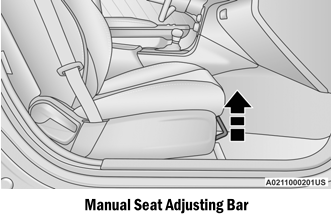Dodge Charger: Manual Adjustment (Front Seats) — If Equipped / Manual Front Seat Forward/Rearward Adjustment
Some models may be equipped with a manual front passenger seat. The seat can be adjusted forward or rearward by using a bar located by the front of the seat cushion, near the floor.

While sitting in the seat, lift up on the bar located under the seat cushion and move the seat forward or rearward. Release the bar once you have reached the desired position. Then, using body pressure, move forward and rearward on the seat to be sure that the seat adjusters have latched.
WARNING!
- Adjusting a seat while driving may be dangerous. Moving a seat while driving could result in loss of control which could cause a collision and serious injury or death.
- Seats should be adjusted before fastening the seat belts and while the vehicle is parked. Serious injury or death could result from a poorly adjusted seat belt.
 Manual Adjustment (Front Seats) — If Equipped
Manual Adjustment (Front Seats) — If Equipped
WARNING!
Adjusting a seat while the vehicle is moving is dangerous. The sudden
movement of the seat could cause you to lose control. The seat belt might not
be adjusted properly and you could be injured...
 Manual Front Seat Recline
Manual Front Seat Recline
To adjust the seatback, lift the lever located on the outboard side of the seat,
lean back to the desired position and release the lever. To return the seatback,
lift the lever, lean forward and release the lever...
Other information:
Dodge Charger 2011-2026 Owner's Manual: DRIVER MEMORY SETTINGS — IF EQUIPPED
This feature allows the driver to save up to two different memory profiles for easy recall through a memory switch. Each memory profile saves desired position settings for the following features: Driver seat Easy Entry/Exit seat (if equipped) Side mirrors Power tilt/telescoping steering column (if equipped) A set of desired radio station presets NOTE: Your vehicle is equipped with two key fobs, each can be linked to either memory position 1 or 2...
Dodge Charger 2011-2026 Owner's Manual: INSTRUMENT CLUSTER
INSTRUMENT CLUSTER DESCRIPTIONS Tachometer Indicates the engine speed in revolutions per minute (RPM x 1000). Instrument Cluster Display When the appropriate conditions exist, this display shows the instrument cluster display messages...
Categories
- Manuals Home
- Dodge Charger Owners Manual
- Dodge Charger Service Manual
- PARKING BRAKE
- How To Use Remote Start
- Opening And Closing The Trunk
- New on site
- Most important about car
Storage, Glove Compartment
The glove compartment is located on the passenger side of the instrument panel.

To open the glove compartment, pull the release handle.
WARNING!
Do not operate this vehicle with a glove compartment in the open position. Driving with the glove compartment open may result in injury in a collision.
